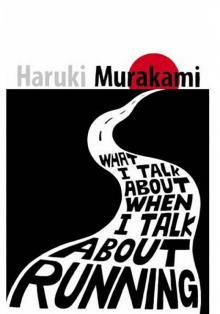- Home
- Haruki Murakami
After the Quake Page 9
After the Quake Read online
Page 9
Frog snapped his mouth shut and closed his round eyes in apparent fatigue.
“So what you’re saying is,” Katagiri said, “that you and I have to go underground together and fight Worm to stop the earthquake.”
“Exactly.”
Katagiri reached for his cup of tea, picked it up, and put it back. “I still don’t get it,” he said. “Why did you choose me to go with you?”
Frog looked straight into Katagiri’s eyes and said, “I have always had the profoundest respect for you, Mr. Katagiri. For sixteen long years, you have silently accepted the most dangerous, least glamorous assignments—the jobs that others have avoided—and you have carried them off beautifully. I know full well how difficult this has been for you, and I believe that neither your superiors nor your colleagues properly appreciate your accomplishments. They are blind, the whole lot of them. But you, unappreciated and unpromoted, have never once complained.
“Nor is it simply a matter of your work. After your parents died, you raised your teenage brother and sister singlehandedly, put them through college, and even arranged for them to marry, all at great sacrifice of your time and income, and at the expense of your own marriage prospects. In spite of this, your brother and sister have never once expressed gratitude for your efforts on their behalf. Far from it: they have shown you no respect and acted with the most callous disregard for your loving-kindness. In my opinion, their behavior is unconscionable. I almost wish I could beat them to a pulp on your behalf. But you, meanwhile, show no trace of anger.
“To be quite honest, Mr. Katagiri, you are nothing much to look at, and you are far from eloquent, so you tend to be looked down upon by those around you. I, however, can see what a sensible and courageous man you are. In all of Tokyo, with its teeming millions, there is no one else I could trust as much as you to fight by my side.”
“Tell me, Mr. Frog—” Katagiri said.
“Please,” Frog said, raising one finger again. “Call me ‘Frog.’ ”
“Tell me, Frog,” Katagiri said, “how do you know so much about me?”
“Well, Mr. Katagiri, I have not been frogging all these years for nothing. I keep my eye on the important things in life.”
“But still, Frog,” Katagiri said, “I’m not particularly strong, and I don’t know anything about what’s happening underground. I don’t have the kind of muscle it will take to fight Worm in the darkness. I’m sure you can find somebody a lot stronger than me—a man who does karate, say, or a Self-Defense Force commando.”
Frog rolled his large eyes. “To tell you the truth, Mr. Katagiri,” he said, “I’m the one who will do all the fighting. But I can’t do it alone. This is the key thing: I need your courage and your passion for justice. I need you to stand behind me and say, ‘Way to go, Frog! You’re doing great! I know you can win! You’re fighting the good fight!’ ”
Frog opened his arms wide, then slapped his webbed hands down on his knees again.
“In all honesty, Mr. Katagiri, the thought of fighting Worm in the dark frightens me, too. For many years I lived as a pacifist, loving art, living with nature. Fighting is not something I like to do. I do it because I have to. And this particular fight will be a fierce one, that is certain. I may not return from it alive. I may lose a limb or two in the process. But I cannot—I will not—run away. As Nietzsche said, the highest wisdom is to have no fear. What I want from you, Mr. Katagiri, is for you to share your simple courage with me, to support me with your whole heart as a true friend. Do you understand what I am trying to tell you?”
None of this made any sense to Katagiri, but still he felt that—unreal as it sounded—he could believe whatever Frog said to him. Something about Frog—the look on his face, the way he spoke—had a simple honesty to it that appealed directly to the heart. After years of work in the toughest division of the Security Trust Bank, Katagiri possessed the ability to sense such things. It was all but second nature to him.
“I know this must be difficult for you, Mr. Katagiri. A huge frog comes barging into your place and asks you to believe all these outlandish things. Your reaction is perfectly natural. And so I intend to provide you with proof that I exist. Tell me, Mr. Katagiri, you have been having a great deal of trouble recovering a loan the bank made to Big Bear Trading, have you not?”
“That’s true,” Katagiri said.
“Well, they have a number of extortionists working behind the scenes, and those individuals are mixed up with the mobsters. They’re scheming to make the company go bankrupt and get out of its debts. Your bank’s loan officer shoved a pile of cash at them without a decent background check, and, as usual, the one who’s left to clean up after him is you, Mr. Katagiri. But you’re having a hard time sinking your teeth into these fellows: they’re no pushovers. And there may be a powerful politician backing them up. They’re into you for seven hundred million yen. That is the situation you are dealing with, am I right?”
“You certainly are.”
Frog stretched his arms out wide, his big green webs opening like pale wings. “Don’t worry, Mr. Katagiri. Leave everything to me. By tomorrow morning, old Frog will have your problems solved. Relax and have a good night’s sleep.”
With a big smile on his face, Frog stood up. Then, flattening himself like a dried squid, he slipped out through the gap at the side of the closed door, leaving Katagiri all alone. The two teacups on the kitchen table were the only indication that Frog had ever been in Katagiri’s apartment.
The moment Katagiri arrived at work the next morning at nine, the phone on his desk rang.
“Mr. Katagiri,” said a man’s voice. It was cold and businesslike. “My name is Shiraoka. I am an attorney with the Big Bear case. I received a call from my client this morning with regard to the pending loan matter. He wants you to know that he will take full responsibility for returning the entire amount requested by the due date. He will also give you a signed memorandum to that effect. His only request is that you do not send Frog to his home again. I repeat: he wants you to ask Frog never to visit his home again. I myself am not entirely sure what this is supposed to mean, but I believe it should be clear to you, Mr. Katagiri. Am I correct?”
“You are indeed,” Katagiri said.
“You will be kind enough to convey my message to Frog, I trust.”
“That I will do. Your client will never see Frog again.”
“Thank you very much. I will prepare the memorandum for you by tomorrow.”
“I appreciate it,” Katagiri said.
The connection was cut.
Frog visited Katagiri in his Trust Bank office at lunchtime. “That Big Bear case is working out well for you, I presume?”
Katagiri glanced around uneasily.
“Don’t worry,” Frog said. “You are the only one who can see me. But now I am sure you realize that I actually exist. I am not a product of your imagination. I can take action and produce results. I am a real, living being.”
“Tell me, Mr. Frog—”
“Please,” Frog said, raising one finger. “Call me ‘Frog.’ ”
“Tell me, Frog,” Katagiri said, “what did you do to them?”
“Oh, nothing much,” Frog said. “Nothing much more complicated than boiling Brussels sprouts. I just gave them a little scare. A touch of psychological terror. As Joseph Conrad once wrote, true terror is the kind that men feel toward their imagination. But never mind that, Mr. Katagiri. Tell me about the Big Bear case. It’s going well?”
Katagiri nodded and lit a cigarette. “Seems to be.”
“So, then, have I succeeded in gaining your trust with regard to the matter I broached to you last night? Will you join me to fight against Worm?”
Sighing, Katagiri removed his glasses and wiped them. “To tell you the truth, I’m not too crazy about the idea, but I don’t suppose that’s enough to get me out of it.”
“No,” Frog said. “It is a matter of responsibility and honor. You may not be too ‘crazy’ about the idea, b
ut we have no choice: you and I must go underground and face Worm. If we should happen to lose our lives in the process, we will gain no one’s sympathy. And even if we manage to defeat Worm, no one will praise us. No one will ever know that such a battle even raged far beneath their feet. Only you and I will know, Mr. Katagiri. However it turns out, ours will be a lonely battle.”
Katagiri looked at his own hand for a while, then watched the smoke rising from his cigarette. Finally, he spoke. “You know, Mr. Frog, I’m just an ordinary person.”
“Make that ‘Frog,’ please,” Frog said, but Katagiri let it go.
“I’m an absolutely ordinary guy. Less than ordinary. I’m going bald, I’m getting a potbelly, I turned forty last month. My feet are flat. The doctor told me recently that I have diabetic tendencies. It’s been three months or more since I last slept with a woman—and I had to pay for it. I do get some recognition within the division for my ability to collect on loans, but no real respect. I don’t have a single person who likes me, either at work or in my private life. I don’t know how to talk to people, and I’m bad with strangers, so I never make friends. I have no athletic ability, I’m tone-deaf, short, phimotic, nearsighted—and astigmatic. I live a horrible life. All I do is eat, sleep, and shit. I don’t know why I’m even living. Why should a person like me have to be the one to save Tokyo?”
“Because, Mr. Katagiri, Tokyo can only be saved by a person like you. And it’s for people like you that I am trying to save Tokyo.”
Katagiri sighed again, more deeply this time. “All right then, what do you want me to do?”
Frog told Katagiri his plan. They would go underground on the night of February 17 (one day before the earthquake was scheduled to happen). Their way in would be through the basement boiler room of the Shinjuku branch of the Tokyo Security Trust Bank. They would meet there late at night (Katagiri would stay in the building on the pretext of working overtime). Behind a section of wall was a vertical shaft, and they would find Worm at the bottom by climbing down a 150-foot rope ladder.
“Do you have a battle plan in mind?” Katagiri asked.
“Of course I do. We would have no hope of defeating an enemy like Worm without a battle plan. He is a slimy creature: you can’t tell his mouth from his anus. And he’s as big as a commuter train.”
“What is your battle plan?”
After a thoughtful pause, Frog answered, “Hmm, what is it they say—‘Silence is golden’?”
“You mean I shouldn’t ask?”
“That’s one way of putting it.”
“What if I get scared at the last minute and run away? What would you do then, Mr. Frog?”
“ ‘Frog.’ ”
“Frog. What would you do then?”
Frog thought about this a while and answered, “I would fight on alone. My chances of beating him by myself are perhaps just slightly better than Anna Karenina’s chances of beating that speeding locomotive. Have you read Anna Karenina, Mr. Katagiri?”
When he heard that Katagiri had not read the novel, Frog gave him a look as if to say, What a shame. Apparently Frog was very fond of Anna Karenina.
“Still, Mr. Katagiri, I do not believe that you will leave me to fight alone. I can tell. It’s a question of balls—which, unfortunately, I do not happen to possess. Ha ha ha ha!” Frog laughed with his mouth wide open. Balls were not all that Frog lacked. He had no teeth, either.
Unexpected things do happen, however.
Katagiri was shot on the evening of February 17. He had finished his rounds for the day and was walking down the street in Shinjuku on his way back to the Trust Bank when a young man in a leather jacket leaped in front of him. The man’s face was a blank, and he gripped a small black gun in one hand. The gun was so small and so black it hardly looked real. Katagiri stared at the object in the man’s hand, not registering the fact that it was aimed at him and that the man was pulling the trigger. It all happened too quickly: it didn’t make sense to him. But the gun in fact went off.
Katagiri saw the barrel jerk in the air and, at the same moment, felt an impact as though someone had struck his right shoulder with a sledgehammer. He felt no pain, but the blow sent him sprawling on the sidewalk. The leather briefcase in his right hand went flying in the other direction. The man aimed the gun at him again. A second shot rang out. A small eatery’s sidewalk signboard exploded before his eyes. He heard people screaming. His eyeglasses had flown off, and everything was a blur. He was vaguely aware that the man was approaching with the pistol pointed at him. I’m going to die, he thought. Frog had said that true terror is the kind that men feel toward their imagination. Katagiri cut the switch of his imagination and sank into a weightless silence.
When he woke up, he was in bed. He opened one eye, took a moment to survey his surroundings, and then opened the other eye. The first thing that entered his field of vision was a metal stand by the head of the bed and an intravenous feeding tube that stretched from the stand to where he lay. Next he saw a nurse dressed in white. He realized that he was lying on his back on a hard bed and wearing some strange piece of clothing, under which he seemed to be naked.
Oh yeah, he thought, I was walking along the sidewalk when some guy shot me. Probably in the shoulder. The right one. He relived the scene in his mind. When he remembered the small black gun in the young man’s hand, his heart made a disturbing thump. The sons of bitches were trying to kill me! he thought. But it looks as if I made it through OK. My memory is fine. I don’t have any pain. And not just pain: I don’t have any feeling at all. I can’t lift my arm…
The hospital room had no windows. He could not tell whether it was day or night. He had been shot just before five in the evening. How much time had passed since then? Had the hour of his nighttime rendezvous with Frog gone by? Katagiri searched the room for a clock, but without his glasses he could see nothing at a distance.
“Excuse me,” he called to the nurse.
“Oh, good, you’re finally awake,” the nurse said.
“What time is it?”
She looked at her watch.
“Nine-fifteen.”
“P.M.?”
“Don’t be silly, it’s morning!”
“Nine-fifteen a.m.?” Katagiri groaned, barely managing to lift his head from the pillow. The ragged noise that emerged from his throat sounded like someone else’s voice. “Nine-fifteen a.m. on February 18?”
“Right,” the nurse said, lifting her arm once more to check the date on her digital watch. “Today is February 18, 1995.”
“Wasn’t there a big earthquake in Tokyo this morning?”
“In Tokyo?”
“In Tokyo.”
The nurse shook her head. “Not as far as I know.”
He breathed a sigh of relief. Whatever had happened, the earthquake at least had been averted.
“How’s my wound doing?”
“Your wound?” she asked. “What wound?”
“Where I was shot.”
“Shot?”
“Yeah, near the entrance to the Trust Bank. Some young guy shot me. In the right shoulder, I think.”
The nurse flashed a nervous smile in his direction. “I’m sorry, Mr. Katagiri, but you haven’t been shot.”
“I haven’t? Are you sure?”
“As sure as I am that there was no earthquake this morning.”
Katagiri was stunned. “Then what the hell am I doing in a hospital?”
“Somebody found you lying in the street, unconscious. In the Kabukicho neighborhood of Shinjuku. You didn’t have any external wounds. You were just out cold. And we still haven’t found out why. The doctor’s going to be here soon. You’d better talk to him.”
Lying in the street unconscious? Katagiri was sure he had seen the pistol go off aimed at him. He took a deep breath and tried to get his head straight. He would start by putting all the facts in order.
“What you’re telling me is, I’ve been lying in this hospital bed, unconscious, since early evening yest
erday, is that right?”
“Right,” the nurse said. “And you had a really bad night, Mr. Katagiri. You must have had some awful nightmares. I heard you yelling, ‘Frog! Hey, Frog!’ You did it a lot. You have a friend nicknamed ‘Frog’?”
Katagiri closed his eyes and listened to the slow, rhythmic beating of his heart as it ticked off the minutes of his life. How much of what he remembered had actually happened, and how much was hallucination? Did Frog really exist, and had Frog fought with Worm to put a stop to the earthquake? Or had that just been part of a long dream? Katagiri had no idea what was true anymore.
Frog came to his hospital room that night. Katagiri awoke to find him in the dim light, sitting on a steel folding chair, his back against the wall. Frog’s big, bulging green eyelids were closed in a straight slit.
“Frog!” Katagiri called out to him.
Frog slowly opened his eyes. His big white stomach swelled and shrank with his breathing.
“I meant to meet you in the boiler room at night the way I promised,” Katagiri said, “but I had an accident in the evening— something totally unexpected—and they brought me here.”
Frog gave his head a slight shake. “I know. It’s OK. Don’t worry. You were a great help to me in my fight, Mr. Katagiri.”
“I was?”
“Yes, you were. You did a great job in your dreams. That’s what made it possible for me to fight Worm to the finish. I have you to thank for my victory.”
“I don’t get it,” Katagiri said. “I was unconscious the whole time. They were feeding me intravenously. I don’t remember doing anything in my dreams.”
“That’s fine, Mr. Katagiri. It’s better that you don’t remember. The whole terrible fight occurred in the area of imagination. That is the precise location of our battlefield. It is there that we experience our victories and our defeats. Each and every one of us is a being of limited duration: all of us eventually go down to defeat. But as Ernest Hemingway saw so clearly, the ultimate value of our lives is decided not by how we win but by how we lose. You and I together, Mr. Katagiri, were able to prevent the annihilation of Tokyo. We saved a hundred and fifty thousand people from the jaws of death. No one realizes it, but that is what we accomplished.”

 Sputnik Sweetheart
Sputnik Sweetheart Dance Dance Dance
Dance Dance Dance The Wind (1) and Up Bird Chronicle (2)
The Wind (1) and Up Bird Chronicle (2) Blind Willow, Sleeping Woman
Blind Willow, Sleeping Woman Absolutely on Music: Conversations With Seiji Ozawa
Absolutely on Music: Conversations With Seiji Ozawa Norwegian Wood
Norwegian Wood South of the Border, West of the Sun
South of the Border, West of the Sun Kafka on the Shore
Kafka on the Shore Men Without Women
Men Without Women After Dark
After Dark Hard-Boiled Wonderland and the End of the World
Hard-Boiled Wonderland and the End of the World 1q84
1q84 The Wind-Up Bird Chronicle
The Wind-Up Bird Chronicle Underground: The Tokyo Gas Attack and the Japanese Psyche
Underground: The Tokyo Gas Attack and the Japanese Psyche Vintage Murakami
Vintage Murakami The Elephant Vanishes: Stories
The Elephant Vanishes: Stories Colorless Tsukuru Tazaki and His Years of Pilgrimage
Colorless Tsukuru Tazaki and His Years of Pilgrimage First Person Singular
First Person Singular After the Quake
After the Quake A Wild Sheep Chase
A Wild Sheep Chase What I Talk About When I Talk About Running
What I Talk About When I Talk About Running Birthday Girl
Birthday Girl The Elephant Vanishes
The Elephant Vanishes Norwegian Wood (Vintage International)
Norwegian Wood (Vintage International) Wind/Pinball
Wind/Pinball Norwegian Wood Vol 1.
Norwegian Wood Vol 1. Underground
Underground Colorless Tsukuru Tazaki and His Years of Pilgrimage: A novel
Colorless Tsukuru Tazaki and His Years of Pilgrimage: A novel Killing Commendatore
Killing Commendatore Absolutely on Music
Absolutely on Music